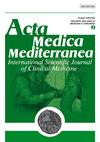Premenstrual Syndrome as a Sleep Disturbing Factor: A Cross-Sectional Study
IF 0.3
4区 医学
Q4 Medicine
引用次数: 2
Abstract
Objective: To evaluate the lifestyle factors possibly related with premenstrual syndrome which were body mass index, coffee intake, smoking, regular physical exercise, and alcohol consumption, and investigate the impact of these lifestyle factors and premenstrual syndrome on sleep quality. Methods and Methods: This cross-sectional study included 265 participants, and all applied Pittsburgh Sleep Quality Index and Premenstrual Syndrome Scale questionnaires. Results: The prevalence of premenstrual syndrome among the participants was 57% (n:150). Participants with premenstrual syndrome had shorter total sleep time (p:0.001). Also, they needed longer time to fall asleep (p:0.001). The Pittsburgh Sleep Quality Index scores of the participants with premenstrual syndrome were higher than those without premenstrual syndorme (p<0.001), indicating poor sleep quality. It was observed that the participants with premenstrual syndrome had more coffee intake (p:0.040) and more regular physical activity (p:0.009), which were risk factors of premenstrual syndrome. premenstrual syndrome positivity was associated with increased poor sleep quality in both univariate and multivariate analyses (OR:5.93 95% CI: 3.46-10.15, p<0.001; OR:5.61 95% CI: 3.19-9.88, p<0.001, respectively). The remaining variables, which were risk factors of premenstrual syndrome, didn’t have any statistically significant association with sleep quality. Conclusion: The important relation between premenstrual syndrome and sleep quality is highlighted. Relief of premenstrual syndrome complaints may lead to better sleep quality and enhancement of quality of life for a woman.经前综合症作为睡眠干扰因素:一项横断面研究
目的:评价可能与经前综合征相关的生活方式因素(体重指数、咖啡摄入、吸烟、定期体育锻炼和饮酒),探讨这些生活方式因素和经前综合征对睡眠质量的影响。方法:本研究共纳入265名受试者,采用匹兹堡睡眠质量指数和经前综合征量表进行问卷调查。结果:经前综合征的患病率为57% (n:150)。经前综合症患者的总睡眠时间较短(p:0.001)。此外,他们需要更长的时间才能入睡(p:0.001)。有经前综合症的受试者匹兹堡睡眠质量指数得分高于无经前综合症的受试者(p<0.001),表明睡眠质量较差。据观察,经前综合症的参与者有更多的咖啡摄入量(p:0.040)和更有规律的身体活动(p:0.009),这些都是经前综合症的危险因素。在单因素和多因素分析中,经前综合征阳性与睡眠质量差增加相关(OR:5.93 95% CI: 3.46-10.15, p<0.001;OR:5.61 95% CI: 3.19-9.88, p<0.001)。其余的变量,即经前综合症的危险因素,与睡眠质量没有统计学上的显著关联。结论:经前综合征与睡眠质量有重要关系。缓解经前综合症可能会改善女性的睡眠质量,提高生活质量。
本文章由计算机程序翻译,如有差异,请以英文原文为准。
求助全文
约1分钟内获得全文
求助全文
来源期刊

Acta Medica Mediterranea
医学-医学:内科
自引率
0.00%
发文量
0
审稿时长
6-12 weeks
期刊介绍:
Acta Medica Mediterranea is an indipendent, international, English-language, peer-reviewed journal, online and open-access, designed for internists and phisicians.
The journal publishes a variety of manuscript types, including review articles, original research, case reports and letters to the editor.
 求助内容:
求助内容: 应助结果提醒方式:
应助结果提醒方式:


